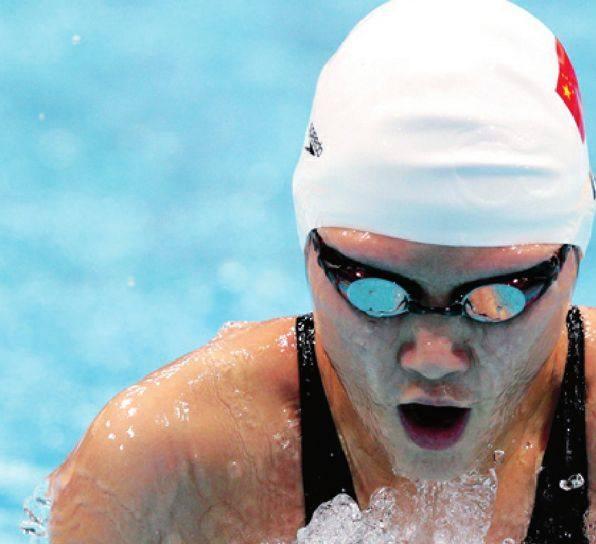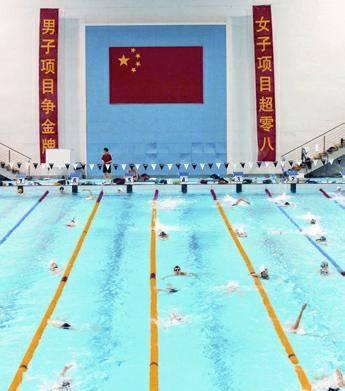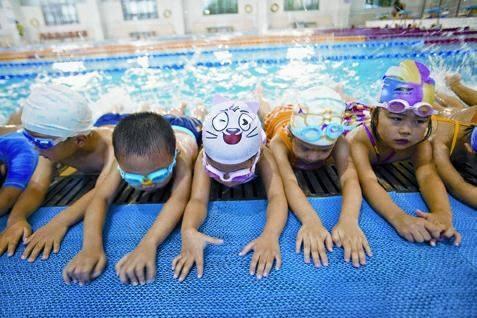RISING STARS
By Tang Yuankai



On the first day of the London 2012 Olympic Games, the fabulous performances of two young Chinese swimmers—Sun Yang and Ye Shiwen—stunned a worldwide audience. But before the two stars could enjoy their victory, Western media sources went on the attack with doping accusations. Though the suspicions were later proved to be groundless, their biased criticism irked many Chinese fans.
On July 28, the 21-year-old Sun won the mens 400-meter freestyle at 3:40.14, setting a new Olympic record and becoming the first male Chinese swimmer to claim Olympic gold. And Ye, 16, broke the womens 400-meter medley world record at 4:28.43.
Poolside prejudice
It is no longer a surprise when Chinese athletes win Olympic medals. But in the swimming pools, where European and American athletes have long dominated, elite Chinese swimmers are still a rare sight.
At the 1992 Olympic Games in Barcelona, Chinese swimmers emerged triumphantly to win four gold medals and five silver medals. But in the 10 years following that success, they suffered a sharp decline, taking only one gold medal in the Atlanta, Athens and Beijing Olympics respectively, and zero in Sydney.
Hence the worlds astonishment when Sun and Ye swept away two gold medals on the first day of competition in London.
The dominant performance put on by Chinese swimmers that day was certainly unexpected, said a BBC host during the live broadcast.
While record-breaking Olympic performances are often subject to suspicion, the breathtaking speed of Sun and Ye attracted an unusual number of groundless attacks.
Before Sun, Chinese male swimmers best result was one silver medal won by Zhang Lin in the 2008 Beijing Olympic Games. Sungold medal was a shocking breakthrough.
Yes performance was equally outstanding. Her result in the womens 400-meter medley beat the world record by nearly one second. In the last 50 meters of her freestyle race, Yes time was just 28.93 seconds, 0.17 seconds faster than American gold medal winner Ryan Lochte in the mens 400-meter medley—an extremely rare feat in swimming competitions.
“My achievements come from hard training. I have never taken drugs to enhance my performance,” said Ye.
Her assertion has been confirmed by the report of the World Anti-Doping Agency, which showed Ye passed the drug test after the competition. All results complied with the standards, and no evidence of performanceenhancing drugs was found.
Ye was clean and she “deserves recognition for her talent,” said Lord Colin Moynihan, Chairman of the British Olympic Association.
Since the athletes arrived in London, they have received doping tests from various organizations, including the International Olympic Committee, International Sports Federations and the British anti-doping organizations. The tests included blood and urine samples. The swimmers were given particularly close
attention. All Chinese athletes went through all the tests and proved to be clean, said Jiang Zhixue, the anti-doping chief of Chinas General Administration of Sport (GAS).
“In recent years, the Chinese Swimming Association has made great efforts to combat doping. Under any circumstances, once any athlete is found to be using performanceenhancing drugs, he or she will be severely punished. It is unfair for anyone to improve their performance by doping,” said Jiang.
Despite some peoples doping suspicions, there were also a large number of international audiences supporting Ye. An opinion poll by Australias Brisbane Times showed that of the 5,000 people who voted, 56 percent held it was unfair to question Yes performance.
Many swimming athletes from other countries also came to the defense of their young Chinese counterpart.
People shouldnt groundlessly accuse an athlete of doping after their achievements just because they are from a different country, said Ian Thorpe, a famous Australian swimmer.
Thorpe first won the World Championship in mens 400-meter freestyle at the early age of 15. His success showed how young swimmers can accomplish incredible feats against more experienced competitors.
Ye won a second gold medal in the womens 200-meter medley and broke the events Olympic record.
Altogether, the Chinese swimming team won 10 medals, including five gold, two silver and three bronze.
Secret to success
In fact, the Chinese swimmers excellent performance is no accident. Their strengths had been demonstrated long ago.
For instance, Jiao Liuyang, who won the gold medal in the womens 200-meter butterfly in London, was the silver medal winner in Beijing Olympic Games in 2008. Two years ago, then 14-year-old Ye defeated the world record holder, famous American swimmer Allison Schmitt, in the womens 200-meter and 400-meter medleys, becoming the worlds second best in the womens 200-meter medley in 2010.
Ye is considered to be a born swimmer. Her big hands and size-10.5 feet give her big advantage in the water. This is a key edge in swimming—for instance, top American swimmer Michael Phelps wears a size 14.
“Yes gift in swimming is beyond any doubt. Her leg strength is superior, as is her speed, endurance and coordination. She can perform all four swimming styles at a high level,” said Yes coach Xu Guoyi.
However, what Xu appreciates most is not Yes outstanding gift but her diligence. She trains hard year-round. Immediately after the World Swimming Championship ended in Shanghai in July of 2011, Xu led Ye into preparation for the London Olympic Games. Within one years time, they have been to a high altitude training camp twice.
“She trained at a high altitude twice a day, and each day, she swam at least 8,000 meters. Very few can bear such a heavy workload, but she made it through the training,” said Xu.
The hard training has proven fruitful.“Yes performance in London has greatly improved since last year, “ said Xu.
“Scientific training is the key to my success,” said Ye.
In the daily training of Chinese athletes, a research team evaluates their training load and body conditions, so that they can plan the best training schedule while ensuring the athleteshealth.
In the past few years, China has also learned from the accomplishments of Australia and the United States, providing another element to the success of Chinese swimmers.
Nationwide support
Ever since Sun and Ye dazzled the world audience at the London Olympic Games, the popularity of their alma mater, Chen Jinglun Sport School in Hangzhou of Zhejiang Province, has soared.
Parents in Hangzhou are now eager to send their children to the school, reputedly a cradle of world champion swimmers.
“The success of Sun inspired more parents to send their children to pursue swimming. Now that we have a larger pool of children to choose from, and are more likely to find even more gifted swimmers,” said coach Chen Yunpeng.
Only a chosen few can enter the school. Every year, coaches in the school tour nearly 200 kindergartens in the city in search of promising swimmers. First, 800 children are picked to receive concentrated training. After the training, the school keeps about 150 of these children.
Currently, about 350 children aged 6-13 receive training in the school every day. The school is geared to developing sports pro- grams, allowing children to train in their spare time, in the evenings when school is in session and during the daytime over holidays.
In the school, a 6-year-old typically swims 5,000 to 6,000 meters per day. “Heavy aerobic exercises are pivotal to improving swimmers ability,” said Bai Ziyue, the schools Vice President.
In addition to large amount of aerobic exercises, the school also emphasizes technique. Sun is known for his exceptional breathing technique. While most swimmers inhale when stroking water with their arms, Sun inhales when his hands are out of water,” said coach Chen. Chen believed this advanced technique made Sun stand out above the crowd.
The school, founded in 1956, is designated by the GAS as a training base for prospective high-caliber athletes. So far, it has produced many national and world champions in multiple sports.
The school is at the grassroots level of Chinas Nationwide Sport System (NSS) of competitive sports.
“Specifically, the NSS requires the government to be responsible for the athletes training. In the system, amateur sports schools, provincial teams, and national teams form a complete training chain, which ensures an abundant supply of back-up sports talents,” said Wei Jizhong, President of the International Volleyball Federation. Wei once served as secretary general of the Chinese Olympic Committee for 12 years.
Talented students trained at Chen Jinglun Sport School will be selected into provincialsports teams to compete in national sporting games. Outstanding athletes will be selected into the national sports team.
The rise of the Chinese swimming team should also be credited to a project codenamed 119.
Of the Olympic Games, the three big sports—swimming, track and field, aquatics—altogether produce 119 gold medals. However, these three are the short board of China. Thus came the need for the 119 Project, which aims to enhance the Chinese athletes performance in these fields.
In the Sydney 2000 Olympic Games, the Chinese swimming team went home with no gold medals at all. Following this disappointment, the project was silently launched.
An interesting coincidence is that “119”happens to be the fire emergency phone number in China. About this, Wei Di, then Director of the Administration Center of Aquatic Sports under GAS, pointed out the code 119 refers to a “warning.”
However, GAS never disclosed the 119 Project to the public until breakthroughs were made at the Athens 2004 Olympic Games.
In Athens, China got the first gold medal in aquatics; Liu Xiang became the first Chinese to win the title of mens 110-meter hurdles; China jumped to the second place in the gold medal standings for the first time; and China won gold medals in an all-time high of 13 sports.
Wei said that under the 119 Project, since 2001, Chinas investment in aquatic sports has greatly increased. The investment hit 20 million yuan ($3.14 million), nearly doubling the previous level.
The government spent 3 million yuan($470,000) on equipment purchases and 1 million yuan ($157,000) on overseas visits and competitions.
“These big investments were unprecedented,” said Wei.
The project also attached great importance to intensive training. In 2001, Chinas Swimming Administration Center reestablished a permanent national team. “Only in this way can the countrys investment in swimming be specifically concentrated on the swimming team, and can the advantage of Chinas nationwide sport system be given a full play,” said Li Hua, Director of the center.
Under the NSS, the government also focuses its investment on new sports and sports without mass participation. The success of this strategy is reflected in Chinas gold medal counting in trampoline during the Beijing and London Olympic Games. Trampoline became an Olympic event in 2000, before which the sport had not been introduced in China. GAS selected athletes from similar sports and trained them in trampoline. Later, trampoline training centers were established. Within a decade, Olympic champions in trampoline such as He Wenna were crowned.
The NSS has proven successful in building a strong force in competitive sports, as shown by the Beijing Olympic Games, said Huang Yaling, a professor at Beijing Sport University.
While the NSS has effectively helped produce great athletes, Olympic gold medals and a sense of pride for the Chinese people, the public also begins to question whether a nations success in sports should be measured solely by the achievement of a small number of sports elites, while leaving out the participation of the general public.
Huang said that to develop people-oriented mass sports, the current system must be reformed.

